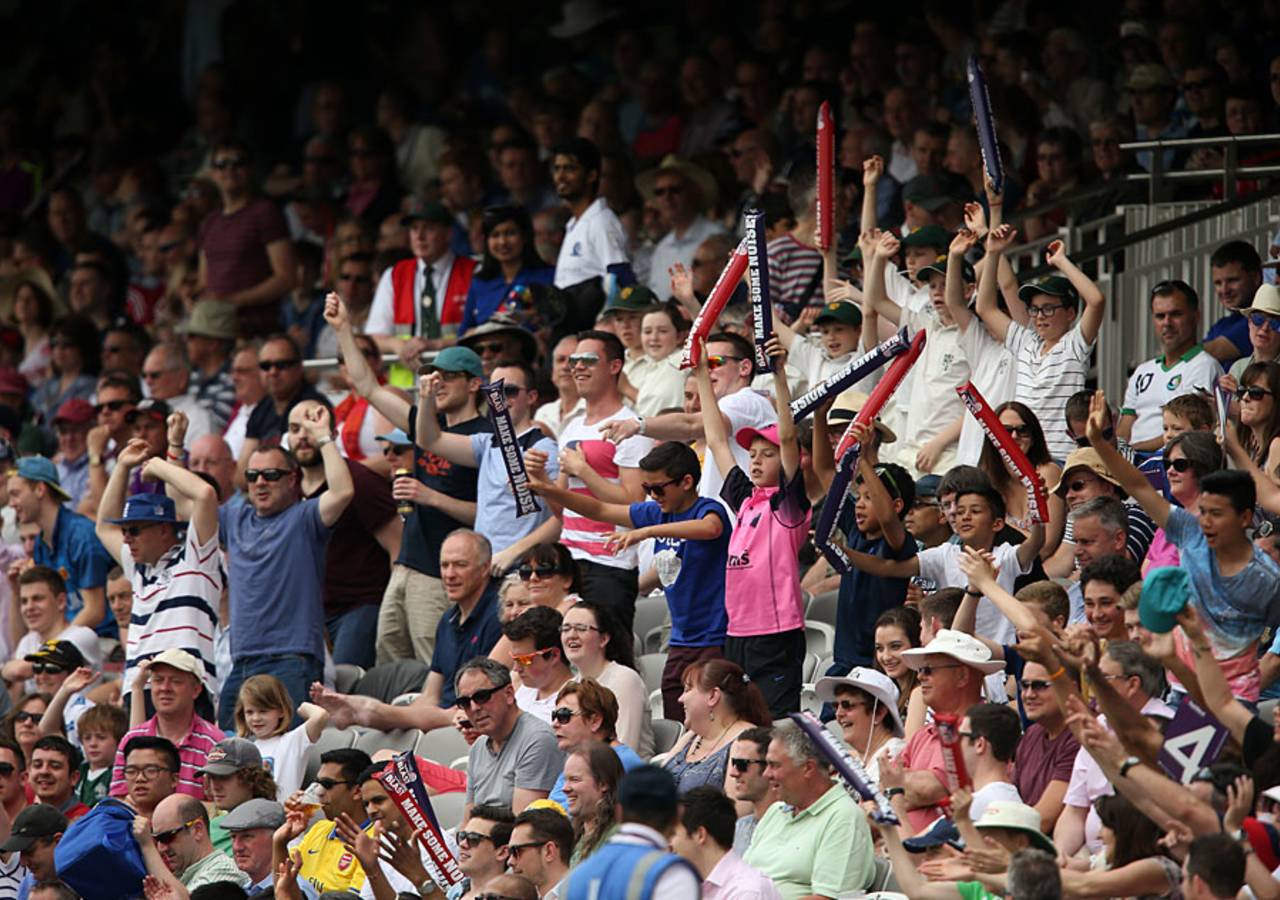The tragedy of fixing
Incidents that in a drama you'd reject as absurd you relish in sport because you know they actually happened. Until you stop believing that they actually happened
Jonathan Wilson
May 20, 2014, 7:51 AM

When fans stop believing in upsets, shocks, and sudden shifts in momentum, cricket ceases to be a sport • Getty Images
A little while ago, I had rather too much to drink with a former Test cricketer. We had both watched a Premier League football match that had finished in a draw after both teams scored in the last ten minutes.
He admitted he was no great expert in football, but was adamant the game must have been fixed. It was clear, he said, that it had been decided the game had to be a draw and so when one team scored, it had then to concede. I was sceptical. The equaliser had come from a moment of brilliant individual skill, the sort of thing that can't just be produced to order. But the former Test player was certain: things like that, he said, don't just happen.
I'd had a similar conversation about a decade earlier in Romania. I had been sitting in a newspaper office in Bucharest, watching the Premier League scores come in with a group of journalists who were avidly checking their fixed odds coupons. Chelsea scored two late goals to turn a 2-1 deficit against Fulham into a 3-2 win. There was general laughter: fix, they all agreed. I should stress, there is absolutely no evidence that game was fixed, nothing beyond the weary cynicism of a group of men who had seen too much to accept the unexpected.
And that, really, is the tragedy of fixing. Yes, it's wrong that people should make money from cheating, and yes, it's sad when showpiece events are proved to have been, at least in part, following a script. But the real cancer is the destruction of faith in sport itself. Upsets and shocks, sudden shifts in the momentum of a game, are the lifeblood of sport, whether it's a team scoring two late goals or a No. 7 hitting an improbable century or a wicketkeeper dropping a simple catch or a bowler suddenly taking four wickets in an over. That's the drama of it: incidents that in a drama you'd reject as absurd you relish in sport because you know they actually happened. Until, that is, you stop believing that they actually happened.
The former Test player told me about his greatest performance for his country. With the opposition chasing a gettable target in the fourth innings, he'd taken three quick wickets in the final session to help secure a narrow victory. He spoke of his pride, of the thought that whatever else happened, he'd helped his country win a memorable victory. Now, he says, he looks back and wonders. Was it genuine?
Why did that player hit the ball in the air from that delivery? And why had that other player missed that straight one to be lbw? The greatest hour of his professional life, he said, had been ruined by doubt, because now he wondered whether he had actually taken those wickets, or whether they had been ordered by some bookmaker on the other end of a phone.
That is terrible. It's like finding out that the wife you thought loved you is being paid to stick around, like finding out that the friends who laugh at your jokes are actually resentful extras, like finding out that the glowing review for your new book was actually written by your agent's best mate. It's like realising you're Truman Burbank. I can't even begin to quantify how that must feel, to strive for years at a skill, to work and practise and hone and refine and then to produce under pressure at a key moment, and not to know whether you deserve the congratulations.
That former Test player had lost his faith in sport, and perhaps even a little in life. Those Romanian journalists were so browbeaten by the regular scandals of the game in their country at the time that they preferred to meet all sport with a carapace of scorn than believe a good team could score two late goals against a less good team. I'm aware that professional football is a pit of backbiting and backhanders, of spivs and charlatans, of sly manipulators taking advantage of the greedy and the gullible.
I haven't made a particular effort to track down match-fixing in football, but I've spoken to a player who was locked in a garage and a coach whose children have been threatened. Anybody who thinks match-fixing doesn't happen in international football should look at the penalty decisions (they're all on YouTube) awarded by a particular referee from Niger over two years before people got wise to him.
There's a football World Cup match in the past decade that felt wrong when I watched it; sure enough, Declan Hill, in his book The Fix, highlights it as one for which there is evidence of wrongdoing.
In many ways football is a deeply unpleasant world, but it's redeemed - still - by the remarkable and the unexpected: Sunderland beating Chelsea and Manchester United away to stay up, Atletico Madrid reaching the Champions League final, Bosnia getting to the World Cup, Zambia winning the Cup of Nations. If I lose faith in that, then football is pointless: it really is just 22 men getting paid vast sums to kick a ball about.
The former Test player, obviously, knows more of his world than I do, but I hope his cynicism is exaggerated. If cricket's following a script, it's no longer a sport.
Jonathan Wilson writes for the Guardian, the National, Sports Illustrated, World Soccer and Fox. He tweets here